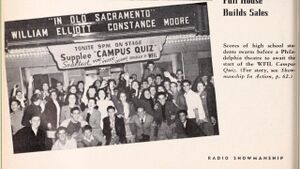Difference between revisions of "Timeline of Quizbowl History"
Jump to navigation
Jump to search
{{History table row|1953|college=* October 10: College Bowl debuts on the NBC radio network. This show will run until 1955 and will introduce the tossup-bonus format.
Matt Weiner (talk | contribs) |
Matt Weiner (talk | contribs) |
||
| Line 46: | Line 46: | ||
* ''[[Scott Hi-Q]]'' (now Delco Hi-Q) begins in the suburbs of Philadelphia.}} | * ''[[Scott Hi-Q]]'' (now Delco Hi-Q) begins in the suburbs of Philadelphia.}} | ||
| + | {{History table row|1950|hs=* [[Bible Bowl]] organizer John P. Reynolds files U.S. patent #2,654,163 for the portable electronic lockout [[buzzer]] system.}} | ||
| + | |||
{{History table row|1949|college=* An event by the name of ''Campus Quiz'' airs on WERD Atlanta and runs through at least 1950. It is unclear whether that this show, hosted by the nation's first black-owned radio station, is directly related to the show created by Wally Butterworth, who was a virulent racist and member of the KKK.<ref name="Valhalla1"/>}} | {{History table row|1949|college=* An event by the name of ''Campus Quiz'' airs on WERD Atlanta and runs through at least 1950. It is unclear whether that this show, hosted by the nation's first black-owned radio station, is directly related to the show created by Wally Butterworth, who was a virulent racist and member of the KKK.<ref name="Valhalla1"/>}} | ||
Revision as of 10:04, 10 May 2023
A timeline of quizbowl history, with a focus on the game's development in the United States. For more targeted discussions of the game's history in other countries, see quizbowl in Canada or quizbowl in the United Kingdom.
Ancient
c. 32 AD
- Chapter 70 of Suetonius's Life of Tiberius describes the emperor peppering expert grammarians with mythological trivia such as "Who was the mother of Hecuba?," "What name did Achilles have among the girls?," and "What were the Sirens accustomed to singing?" In context, this anecdote takes place sometime between the death of Sejanus in 31 AD and Tiberius's own death in 37. While there are many prior examples in ancient literature of riddles and similar, this is the oldest known example of asking difficult factual questions of presumed educated people for the amusement of those involved.
- Note that, even though Suetonius observed over 1900 years ago that such questions are taking knowledge of mythology "to a silly and laughable extreme" ("usque ad ineptias atque derisum"), at least the first two have come up in quizbowl on multiple occasions.
Early History
1938
- Information Please (a panel quiz show) debuts on NBC radio, hosted by Clifton Fadiman. The show will stay on radio until 1951. In the summer of 1952, it will appear on television.
- On the 17 May, 1943 episode, Boris Karloff and Jan Struther became the first on the show to use buzzers, since they were calling in from Hollywood to New York and thus unable to raise their hands to answer.
1940
- Quiz Kids debuts on local Chicago radio. The show runs for 13 years, and other versions eventually pop up in New York, Canada, San Antonio, and Los Angeles. One of the early winners in Chicago is young James Watson, future Nobel laureate and co-discoverer of the double helix nature of DNA.
1945
- The final season of BBC program Transatlantic Quiz is aired on the NBC Blue Radio Network. Hosted by Alastair Cooke, this show involved a panel of Americans competing with a panel of Brits via undersea cable to promote Anglo-American relations during the second World War.[1]
Start of High School Quizbowl | Start of College Quizbowl | ||||||
1946
|
1946
|
||||||
1948
|
|||||||
1950
|
|||||||
1949
|
|||||||
1957
|
|||||||
1959
|
|||||||
1961
|
|||||||
1962
|
1962
|
||||||
1965
|
1965
|
||||||
1968
|
|||||||
1969
|
|||||||
1970
|
|||||||
1976
|
|||||||
The Advent of the NCT | |||||||
1977
|
|||||||
1978
|
|||||||
1981
|
|||||||
1983
|
|||||||
1984
|
|||||||
| 1988 | |||||||
1989
|
|||||||
The Early Modern Era of college quizbowl | |||||||
1990
|
|||||||
1991
|
|||||||
1994
|
|||||||
1996
| |||||||
1996
|
1996
|
||||||
1997
|
1997
|
||||||
The Early Modern Era of high school quizbowl | |||||||
1998
|
|||||||
1999
|
1999
|
||||||
2000
| |||||||
2001
|
|||||||
2005
|
|||||||
2006
|
|||||||
2008
|
2008
|
||||||
The Modern Era of college quizbowl | |||||||
2009
|
2009
|
||||||
The Modern Era of high school quizbowl | |||||||
2010
|
|||||||
2011
| |||||||
2013
|
|||||||
2014
|
2014
|
||||||
2016
| |||||||
2017
|
|||||||
2018
|
|||||||
2019
|
|||||||
2020
| |||||||
2021
|
|||||||
